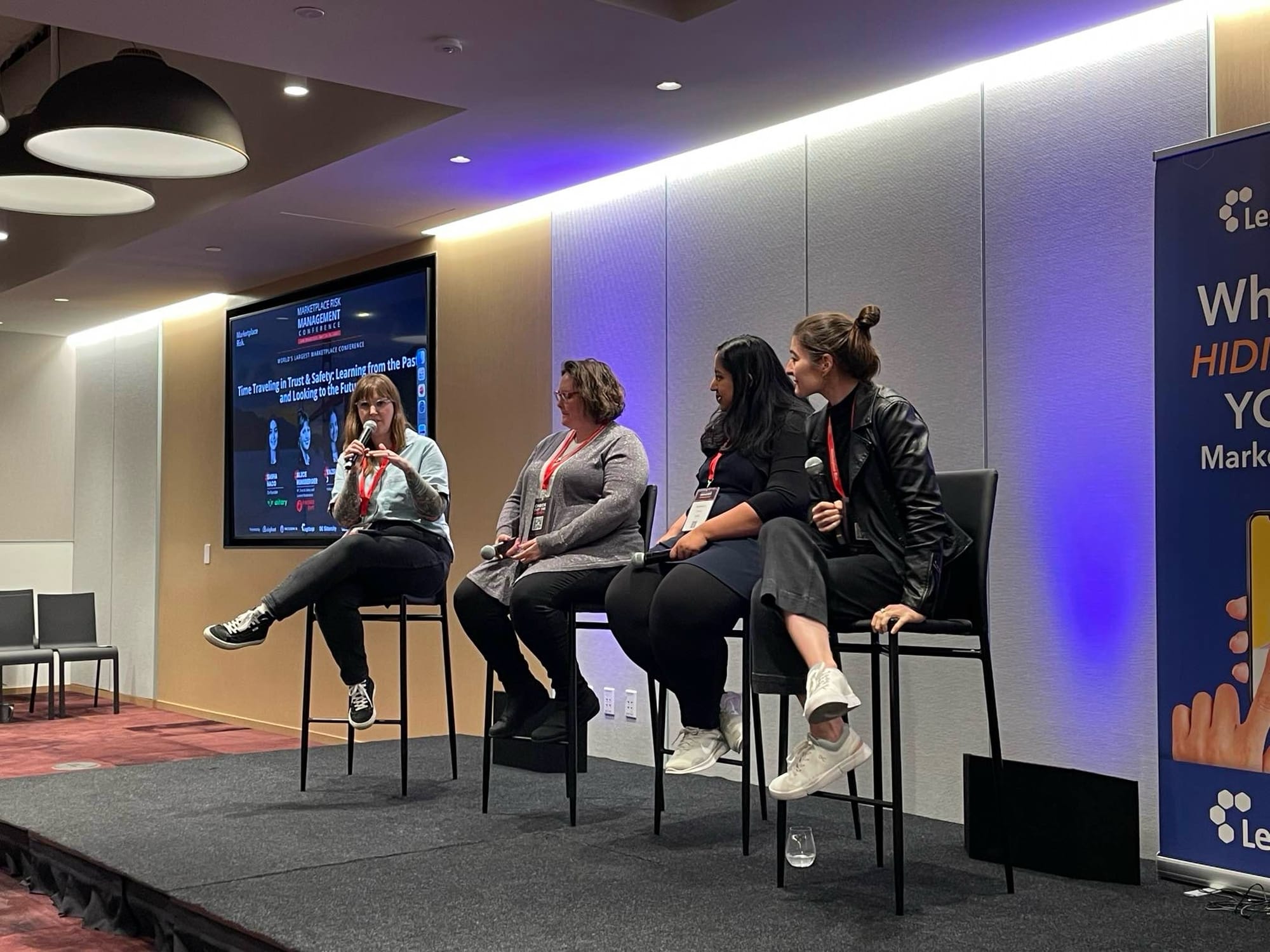What we lose by only being pragmatic about online safety
I'm Alice Hunsberger. Trust & Safety Insider is my weekly rundown on the topics, industry trends and workplace strategies that trust and safety professionals need to know about to do their job.
In today's newsletter, I'm sharing my key takeaways after attending the Marketplace Risk Management Conference in San Francisco last week. It's coming out a day later than usual because — honestly — Ben didn't get a chance to edit it over the weekend. Which is a timely reminder to say that if you're a regular reader, you can support EiM and help it grow by becoming a member for a few dollars a week.
Get in touch if you'd like your questions answered or just want to share your feedback. Here we go! — Alice
What T&S leaders are thinking about, and what we must not forget
If I had to broadly summarise where we are as a Trust & Safety community, I’d say we’re at an inflection point. Over the last 20 years, we have matured as a profession, but society as a whole hasn’t yet come to terms with the tradeoffs of the internet. I think we’re going to look back at the last couple of years and say that this is when everything changed.
This need to keep up was reflected at the Marketplace Risk Management Conference, which I attended last week. Not coincidentally, I organised a panel around this theme titled "Time traveling in Trust & Safety" where my panelists and I discussed the past and future of our industry. I'll come back to that in a second.

Across all of the panel discussions and sessions that I attended, my takeaways were the following:
- It’s more important than ever to know how to communicate clearly and concisely. Leaders should be able to think like an exec, a regulator, and an AI — and communicate like them, too.
- Compliance is becoming increasingly complex. Between safety and privacy regulation and legal challenges to Section 230, leaders are looking for guidance and summaries of what’s new and how to stay compliant. Amie White from Hinge and Garrett Olson from Wolt argued that regulatory compliance can be used as a proxy for innovation and inclusion, which I found very clever.
- The focus is on safety and privacy, not self expression. Interestingly, of the three points of my “Triangle of Tradeoffs”— safety, privacy, and self expression — the latter was hardly mentioned at all. The only time that I heard someone talking about the importance of self expression was when professor Marshall Van Alstyne presented on his theory of using markets to combat misinformation.
I’ll be curious to see if this is also the case TrustCon in July, or if this was partially due to the makeup of the attendees and platforms represented at Marketplace Risk, which had relatively less representation of “speech” platforms. - In this age of efficiency, AI is a gift. Leaders are learning to use AI for T&S enforcement and are seeing good results, though there was a variety of opinions about how much to automate and when.
One of the panels I spoke on was with Alex Popken (VP of T&S, WebPurify) and Michael Dworsky (CEO, Cove) about scaling T&S ops as your marketplace grows. We talked about the need to balance AI and human work, and how it's important to be careful when choosing a vendor to work with as you scale.

My favourite line of the conference was from Michelle McCombs of HopSkipDrive, who said,
“If it only needs a brain, have the AI do it. If it needs a brain and a heart, have people do it.”
The thing that struck me most though was that things are changing so rapidly that no one is looking too far into the future. People were not in the mood for philosophical musings— this conference was for giving people information that they could take back to their jobs and use right away.
It's clear that the next few years will be critical in shaping the future of the internet, and this conference highlighted the need for leaders to adapt quickly to keep up. However, I hope that we don’t lose sight of some of the most important things, even if they seem frivolous at the moment — remembering who we are helping, and why, and what kind of world we want to build. Unless we spend time on these broader, more philosophical questions, we may not like where we end up.
You ask, I answer
Send me your questions — or things you need help to think through — and I'll answer them in an upcoming edition of T&S Insider, only with Everything in Moderation*
Get in touchAlso worth reading
Delivering effective recommendations to tech companies (Anchor Change)
Why? Practical advice for people who are looking to make policy recommendations to tech platforms. Saying something broad like, "moderate more" will get your proposal thrown out. Here's what to say instead.
The Anti-TikTok Law (The Klonickles)
Why? A great summary of the "TikTok ban" and why it's more complicated than it seems.
The Great Flattening (Stratechery)
Why? How Apple's unfortunate ad is a stand-in for the internet as a whole right now.

Member discussion